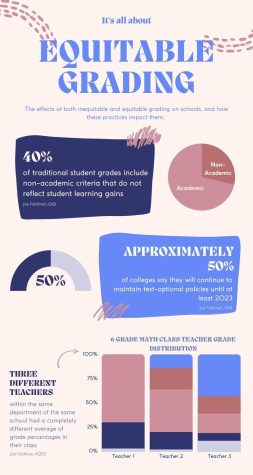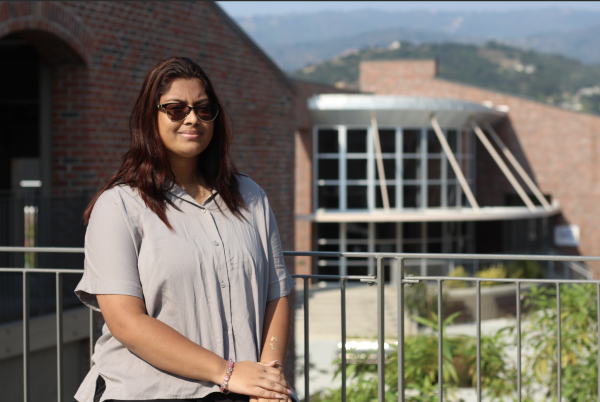MVHS aims to highlight equitable grading
Teachers are introduced to three core philosophies at staff professional development
A graphic illustrating the three philosophies MVHS aims to focus on to encourage equitable grading
September 7, 2022
To encourage a collective commitment towards equitable grading practices, the MVHS Leadership team shared equitable grading practices at the opening professional development for all certificated staff on Wednesday, Aug. 17.
“[It’s] a bit of [an] intersection of a couple of things we’ve been talking about for a couple years,” Principal Ben Clausnitzer said. “One of those is equity, another one being social emotional learning.”
According to Clausnitzer, the meeting was centered around discussing three strategies to ensure equitable grading — giving 50% instead of zeros for missing work, grading based on student work, not the timing and allowing for retakes and redos. The teaching philosophies are adapted from “Grading for Equity” by Joe Feldman. Clausnitzer says these are not new ideas, and the focus of the meeting was to have teachers in coursealike Professional Learning Communities (e.g. all of the teachers who teach freshman Biology) collectively commit to being “more coherent” on those strategies so they will be the same across sections.
“[We’re] adding [to] this conversation about grading practices and all three of those … intersect very much [in] the student-teacher relationship,” Clausnitzer said. “[It] isn’t necessarily a new conversation for us, but it adds another element.”
Despite the collective commitments the leadership team is pushing for, they are unable to mandate a uniform teaching policy due to the California Education Code 49066a, which states that all grades for classes are “determined by the teacher of the course,” and “in the absence of clerical or mechanical mistake, fraud, bad faith or incompetency,” grades will be final.
“While we have common standards, each teacher has their own way that they teach that class,” FUHSD Superintendent Graham Clark said. “It differs [by] department and by teacher, which can cause teaching methods and standards between teachers to differ.”

Although Clausnitzer hopes that following the three strategies can help smooth out these differences, senior Anusha Sainarayanan believes that they have some disadvantages after taking a class with a teacher who implemented the strategies.
“I had a teacher [who was] pretty lenient on deadlines,” Sainarayanan said. “[We] had a deadline, but [we] submitted it whenever we were ready, and the teacher made it apparent that they were OK with that as well. There were a lot of pros and cons to this because if the teacher had assigned something to us [in] January, [there] would be people in May who still hadn’t done it, and I feel like it would put the teacher in a really hard position.”
On the other hand, senior Vidya Bharadwaj believes that more leniency when offering credit for late work is beneficial, as the priority when grading should be on the quality of the work.
“You should get a small deduction when you turn [late work] in, but right now, I know teachers [say], ‘if you turn it in late, you’ll get 50%,’” Bharadwaj said. “I think 50% is way too low — I’m still doing it, you can’t give me 50%. I think [if] my work was worth 100, you should give me a 95 or something closer so it’s not too significant.”
While Sainarayanan acknowledges the drawbacks of leniency with deadlines, she also recognizes that the strategies have certain benefits, such as the ability to retake exams and redo assignments.
“[Sometimes] you can’t get it the first time and [that] doesn’t always mean that you fail,” Sainarayanan said. “I know it’s really hard for the teacher though, because they have to make different versions [of] quizzes. But from a student standpoint, that is really helpful. [You] can’t say that you have mastered something on the first try … It always takes more than one to realize how much you know the content.”
Along with Clausnitzer, Bharadwaj believes that the strategies may be useful because they account for “understanding a student’s situation.” However, she has little hope of teachers actually employing them because of strong, pre-existing teacher opinions.
“Some teachers just have different opinions on how they should teach,” Bharadwaj said. “There are a lot [of] strict teachers and nicer teachers and they probably can’t come to the same terms.”
CHS Principal Kami Tomberlain believes that grading should be based on a student’s knowledge, and that it is important for teachers to recognize that students learn and master concepts at different paces.
“It’s not just about changing policy,” Tomberlain said. “It’s about rethinking what it means to give a grade, what it represents.”























